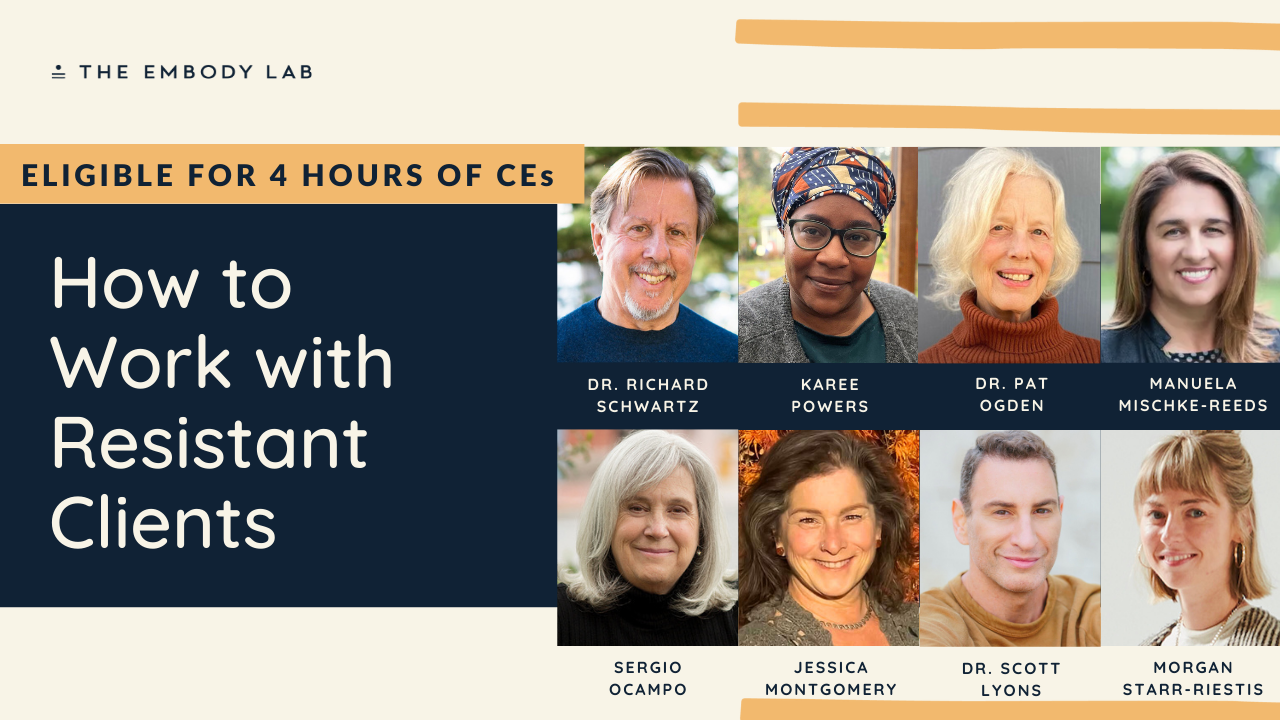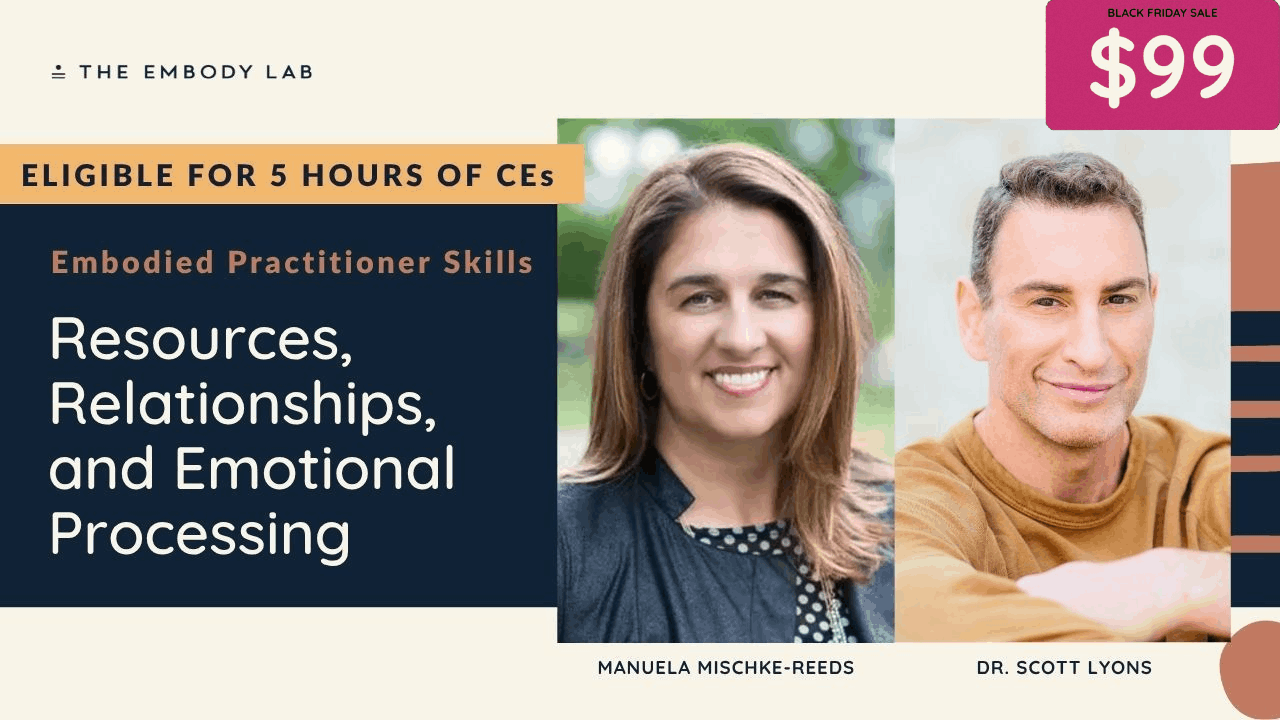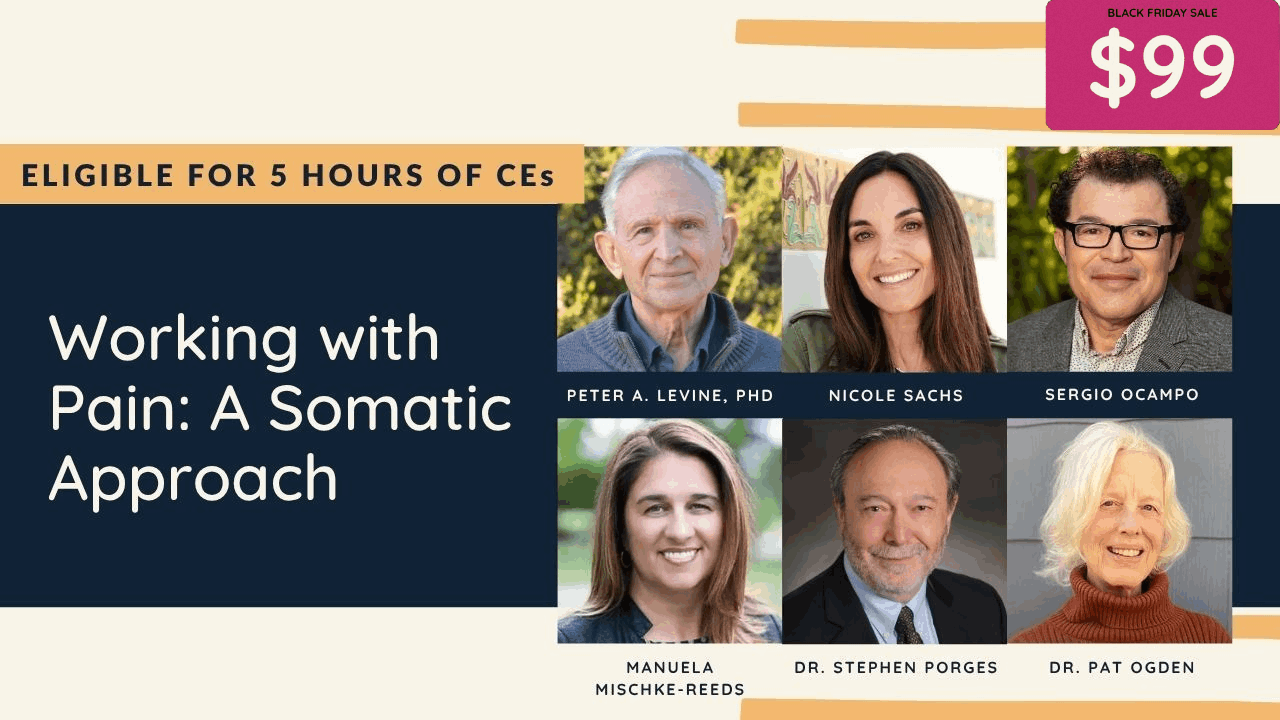
How to Work with Resistant Clients
$447 USD $247
On-Demand Course Length: 4 Hours
"How to Work with Resistant Clients," redefines resistance in therapy, viewing it not as an obstacle but as an intelligent and protective expression from the client. The modules collectively emphasize the importance of the therapist's compassionate and curious attitude towards resistance, exploring its various forms — emotional, somatic, and relational — and its roots in underlying needs, past coping mechanisms, and even safety cues. Through practical techniques like Hakomi's "jumping out of the system" (JOOTS), yielding to resistance, motivational interviewing, and understanding the stages of change, this program empowers therapists to collaborate with clients, create a safe space for exploration, and transform resistance into an opportunity for deeper understanding, growth, and lasting change.
ADD TO CARTAbout this course
How to Work with Resistant Clients
Have you ever felt stuck with a client—like you're working so much harder than they are, circling in the same emotional loops? Often we see resistance as a barrier: defiance, avoidance, lack of readiness. But what if everything we've been taught about resistance is wrong? This transformative course, led by Dr. Scott Lyons, founder of the Embody Lab, offers a radical reframe that changes everything about how we practice.
The Truth About Resistance:
Resistance is rarely a sign of unwillingness. Instead, it's a strategy for safety. These behaviors, movements, and patterns were adaptive when they originally came into being—they helped clients survive. The environment may have changed, relationships may have evolved, but we're creatures of habit. These patterns aren't wrong or bad; they're just outdated. And that part of the client doesn't yet know it's safe to let go, to cry, to express, to change.
When we realize this, everything shifts: we move from confrontation to curiosity, from frustration to compassion, from blame to understanding. Resistance isn't a block—it's a message. And when we learn to listen, healing begins.
A Powerful Perspective Shift:
Dr. Pat Ogden challenges us: "I hate that word. I really think it's insulting." When we call clients resistant, we're often blaming them because our techniques aren't working. Instead, we should ask: Why are my interventions not reaching them? What am I not in contact with? Where don't they feel safe enough?
If you believe clients are resistant, there's something you're missing—they don't feel safe enough, or you're on the wrong track. The solution isn't to push harder but to stop, talk with them, and wonder together: "Are you getting what you need here? Are we on the right track?"
The Fundamental Belief:
At the heart of this work is a profound truth: People are always doing their best, no matter what their circumstances, no matter what their actions. Of course people can do better, but given everything—their history, resources, nervous system capacity, learned patterns—we're all doing our best in each moment.
This belief changes everything. When clients feel that you believe they have intelligence inside them to change, they feel it—and it helps the therapy. When you think you have to push them to change because they don't have it in them, it creates an entirely different therapeutic relationship, an entirely different therapy.
What You'll Learn:
Through four comprehensive modules from expert faculty, you'll discover how to:
Module 1: Embracing Resistance with Jessica Montgomery
Reframing Resistance:
- Reflect on personal experiences with resistance in practice
- Identify patterns in how you respond to resistance
- Explore your own biases and preferences around client engagement
- Understand resistance as natural part of change process
Complex Systems Perspective:
- View self as complex emergent system
- Understand resistance within systems framework
- See resistance as opportunity for deeper understanding and intimacy
- Recognize patterns as part of emergent complexity
The JOOTS Technique: Jumping Out of the System (from Hakomi):
- Naming: Identify and name the resistance pattern
- Claiming: Take responsibility for your part in the dynamic
- Gaming: Experiment with playful engagement
- Reframing: Transform the therapeutic process
- Invite collaboration with client around stuck patterns
- Experiment with new ways of interacting
Sources of Resistance:
- Client behaviors and protective patterns
- Therapist reactions and countertransference
- Aspects of therapeutic relationship itself
- Interactive dynamics between client and therapist
Module 2: How to Work with Resistance with Manuela Mischke-Reeds
Resistance as Intelligence:
- Understand resistance as intelligent expression of client, not problem
- Recognize wisdom in protective mechanisms
- Honor resistance as information about client's needs
- Shift from viewing resistance as obstacle to seeing it as guide
Manifestations of Resistance:
- Emotional resistance: Avoiding or flooding with emotion
- Somatic resistance: Body tension, holding, disconnection
- Relational resistance: Distance, compliance, caretaking of therapist
- Track resistance across multiple domains
The Power of Therapist Attitude:
- Cultivate openness toward resistance
- Bring curiosity about its function and meaning
- Maintain compassionate stance
- Shift away from confrontation and judgment
- Recognize your own relationship with resistance
Yielding to Resistance:
- Practice "yielding" rather than confronting
- Create safe space for protective mechanisms to reveal themselves
- Allow resistance to be present without needing to change it immediately
- Explore resistance with client as ally
- Uncover core beliefs beneath protective patterns
- Build intimacy through honoring protection
Module 3: Working with Resistance with Karee Powers
Defining and Understanding:
- Define resistance as client's obstruction of therapist's methods
- Recognize this definition itself reveals power dynamic
- Understand various forms and their underlying causes
Types of Resistance:
- Realistic resistance: Valid concerns about therapy approach or safety
- Collusive resistance: Unconscious agreements between client and therapist
- Resistance as avoidance: Protection from overwhelming material
- Analyze potential underlying causes for each type
Consequences of Unacknowledged Resistance:
- Impact on therapeutic alliance
- Effects on client engagement and trust
- Damage to relationship when resistance isn't addressed
- Risk of premature termination
Tools for Empowerment:
- Address resistance directly and transparently
- Cultivate genuinely safe therapeutic relationship
- Use motivational interviewing techniques:
- Explore ambivalence about change
- Roll with resistance rather than confront it
- Support self-efficacy and autonomy
- Elicit change talk
- Understand client's perspective on resistance
- Use resistance as opportunity for growth and empowerment
- Shift power dynamic toward collaboration
Module 4: Resistance with Morgan Starr-Riestis
Protective Purpose of Resistance:
- Understand resistance as protecting underlying needs
- Recognize positive intentions beneath seeming obstruction
- See resistance as having inherent purpose
- Honor what resistance is safeguarding
The Log in the River Analogy:
- Current coping mechanisms once provided safety (the log kept them afloat)
- Though perhaps limiting now, they served crucial protective function
- Can't let go of log until there's new raft (new sense of safety and resources)
- Need to build new structure before releasing old one
- Change feels threatening without alternative safety
Building Safety Before Change:
- Identify physical safety cues (body sensations of safety)
- Recognize emotional safety cues (feelings that signal security)
- Notice mental safety cues (thoughts that support change)
- Build comprehensive sense of safety across domains
- Understand brain is designed to save energy and avoid risk
Working Through Fear:
- Use top-down approach with worst-case scenarios
- Explore: "What's the worst that could happen?"
- Assess reality of feared outcome on scale of 1-10
- Distinguish realistic concerns from catastrophic thinking
- Build capacity to tolerate uncertainty
Values Alignment:
- Link goals with top 3-5 core values
- Enhance motivation through values connection
- Prevent internal conflict between competing values
- Ask "why" questions to uncover deeper needs
- Differentiate surface desires from underlying needs
SMARTER Goal-Setting:
- Specific: Clear, well-defined goals
- Measurable: Track progress concretely
- Attainable: Realistic given current resources
- Relevant: Aligned with values and deeper needs
- Timely: Appropriate pacing for this client
- Evaluated: Regular review and adjustment
- Reward/Revise: Celebrate progress, adjust as needed
- Foster achievable steps toward change
Stages of Change:
- Precontemplation: Not yet considering change
- Contemplation: Thinking about change
- Preparation: Getting ready to change
- Action: Actively changing
- Maintenance: Sustaining change
- Understand where client is in process
- Tailor interventions to stage
Importance and Readiness Rulers:
- Assess importance: "How important is this change to you?" (1-10)
- Assess readiness: "How ready are you to make this change?" (1-10)
- Explore discrepancies between importance and readiness
- Use to tailor appropriate interventions
- Foster self-compassion about ambivalence
Core Competencies Developed Across All Modules:
Fundamental Mindset Shifts:
- Move from seeing resistance as problem to seeing it as protection
- Shift from confrontation to curiosity
- Transform frustration into compassion
- Change from blaming client to examining interventions
- Believe clients are always doing their best
Understanding Resistance:
- Recognize resistance as adaptive behavior from past
- See patterns as outdated survival strategies
- Understand resistance protects positive intentions and needs
- Honor that "letting go" requires new safety structure first
- Recognize resistance as intelligent expression
Creating Safety:
- Build safe therapeutic relationship as foundation
- Identify and strengthen multiple forms of safety cues
- Recognize when clients don't feel safe enough
- Create conditions where old patterns can be released
- Develop "new raft" before expecting client to let go of "log"
Therapeutic Stance:
- Cultivate openness, curiosity, compassion toward resistance
- Practice yielding rather than confronting
- Stop and check in when feeling stuck
- Ask: "Are you getting what you need here?"
- Examine your own interventions before labeling client resistant
Working With Resistance:
- Name and claim patterns (JOOTS technique)
- Make unconscious resistance conscious
- Explore with playfulness and collaboration
- Address directly and transparently
- Roll with resistance in motivational interviewing style
Assessment and Intervention:
- Identify type of resistance (realistic, collusive, avoidance)
- Distinguish emotional, somatic, and relational resistance
- Assess stage of change
- Use importance and readiness rulers
- Tailor interventions to client's actual readiness
Values and Goals:
- Link goals with core values for motivation
- Use SMARTER framework for achievable change
- Work through worst-case scenarios realistically
- Support autonomy and self-efficacy
- Differentiate surface wants from deeper needs
Relational Dynamics:
- Recognize resistance in therapeutic relationship itself
- Examine collusive agreements
- Address power dynamics openly
- Invite genuine collaboration
- Use resistance as opportunity for deeper intimacy
Expert Faculty:
Learn from Jessica Montgomery (Hakomi practitioner and trainer), Manuela Mischke-Reeds (somatic psychotherapist and Hakomi trainer), Karee Powers (licensed clinical social worker), and Morgan Starr-Riestis, with golden nuggets of wisdom from special guests Deb Dana, Dr. Pat Ogden, Dr. Richard Schwartz, and Dr. Scott Lyons.
The Power of Language:
This course acknowledges the problematic nature of the term "resistance" itself. As Dr. Pat Ogden emphasizes, calling clients "resistant" can be demeaning and insulting—it often reflects our own frustration when techniques don't work rather than the client's actual experience. Yet because the term is so prevalent in our field, we use it while simultaneously challenging and reframing it.
What we call "resistance" is actually:
- Adaptive behavior that once ensured survival
- Intelligent protection of vulnerable needs
- The part that doesn't yet know it's safe to change
- A message about where safety hasn't been established
- The system's wisdom about pacing and readiness
From Multiple Perspectives:
This course is unique in offering four distinct yet complementary approaches:
- Hakomi perspective (Montgomery, Mischke-Reeds): Systems thinking, yielding, mindfulness
- Social work perspective (Powers): Types of resistance, empowerment, practical tools
- Coaching perspective (Starr-Riestis): Stages of change, values, goal-setting
- Somatic perspective (throughout): Body-based understanding of safety and protection
Together, they create a comprehensive framework for understanding and working skillfully with what we call resistance.
A Different Therapeutic Relationship:
At the core of this work is a belief that fundamentally changes the therapeutic relationship: people are always doing their best given their circumstances. This isn't naive—it's profound. It means:
- No one is "resistant" on purpose
- Protective patterns served a crucial function
- The intelligence to change exists within the client
- Our job is to create conditions where that intelligence can emerge
- When clients feel believed in, they can access their own capacity
This belief creates a different kind of therapy—one where:
- Clients feel understood, not judged
- Stuck patterns are honored, not pushed against
- Safety is built before change is expected
- Resistance becomes a collaborative exploration
- Healing happens through relationship, not despite it
Transformation Through Understanding:
This course supports professionals in helping clients by:
- Reframing "resistance" as protection and wisdom
- Creating genuine safety before expecting change
- Building "new rafts" of resources and support
- Honoring the intelligence in protective patterns
- Linking change to deep values and meaning
- Assessing and working with actual readiness
- Yielding to rather than confronting protection
- Examining our own interventions when feeling stuck
- Cultivating curiosity instead of frustration
- Trusting clients' inherent capacity for growth
Who This Is For:
Essential training for:
- Therapists feeling stuck with "resistant" clients
- Practitioners frustrated by lack of client progress
- Clinicians who find themselves working harder than clients
- Anyone who's blamed clients for not changing
- Therapists wanting to examine their own stance toward resistance
- Practitioners using motivational interviewing or Hakomi
- Clinicians working with ambivalence about change
- Anyone interested in collaborative, non-confrontational approaches
- Professionals wanting to create more effective therapeutic relationships
What Makes This Course Essential:
Most training teaches you techniques to overcome resistance. This course teaches you that resistance isn't the problem—it's the protector. It's not something to overcome but something to understand, honor, and work with. This fundamental shift transforms everything:
- How you feel when sessions feel stuck
- How clients experience your presence
- How much progress becomes possible
- How the therapeutic relationship deepens
- How healing actually occurs
The Core Truth:
Resistance isn't a block—it's a message. It's the system saying: "I don't feel safe enough yet." "I need more resources before I let go." "This old pattern kept me alive." "I have good reasons for holding on."
When we stop fighting resistance and start listening to it, when we yield instead of confront, when we build safety instead of pushing change, when we believe clients are doing their best—everything changes. We move from confrontation to curiosity, from frustration to compassion, from stuck to spacious.
And in that spaciousness, with attunement and skill, healing begins. Not despite resistance, but through it. Not by overcoming protection, but by honoring it until it's safe enough to soften. Not by working harder than the client, but by creating conditions where their own intelligence and capacity for change can emerge.
This is the art of working with resistance: meeting it with curiosity, understanding its wisdom, and trusting that when people feel truly safe and understood, they naturally move toward growth. Because people aren't resistant—they're protecting something precious. And when that protection is finally honored, transformation becomes possible.
Join our brilliant experts for the following sessions:
JESSICA MONTGOMERY
Jessica Montgomery MSW is a Hakomi Trainer, somatic counselor and counselor-educator based in Portland Oregon, USA. She offers integrative trainings across multiple scopes of practice, enhancing embodied mastery for bodyworkers, physicians, coaches, educators and therapists. With a background in intentional community and retreat facilitation, she offers her blend of mindful, somatic and ecstatic teachings internationally. Together with Donna Roy, she is the developer of Primary Attachment Therapy, a method for direct attachment remediation within secure therapeutic relationship.
Website: www.jessicamontgomerycounseling.com
MANUELA MISCHKE-REEDS
Manuela Mischke-Reeds is an internationally recognized teacher of somatic psychology and the founder of the Hakomi Institute of California. She is also the founder of Embodywise, a non-profit learning community dedicated to training professionals in embodied wisdom and trauma-informed practices.
With over 25 years of clinical experience, Manuela specializes in somatic trauma therapy, working with a diverse range of clients, including trauma survivors, first responders, executives, and teams. She is the creator of the Innate Somatic Intelligence Trauma Therapy Approach (ISITTA), an in-depth training program designed for therapists and practitioners. This approach integrates her passions for Continuum, trauma healing, and Buddhist principles to support deep transformation.
Manuela lectures and leads workshops worldwide on mindfulness-based somatic psychology, trauma healing, well-being, and compassionate leadership. Her latest books, Trauma Sensitive Movement: 96 Somatic Techniques to Support Nervous System Regulation and Embodied Transformation in Therapy (PESI, 2025) and Embodied Psychedelic Therapy: A Somatic Guide (Norton, 2025), offer practical resources for professionals working in trauma and psychedelic-assisted therapy.
She is also the author of 125 Somatic Psychotherapy Tools for Trauma and Stress (PESI, 2018) and 8 Keys to Practicing Mindfulness: Practical Strategies for Emotional Health and Well-Being (W.W. Norton, 2015).
To learn more about her work, visit www.embodywise.com and www.manuelamischkereeds.com.
Instagram: @embodywise
KAREE POWERS
Karee Powers, LICSW, EMDR-C is certified in EMDR and is an EMDR trainer and consultant. She has over 17 years of experience providing psychotherapy in a variety of settings including inpatient facilities, and non-profit organizations offering care for children, adolescents and adult survivors of abuse, neglect, combat trauma, sexual trauma, phobias, generational trauma, and interpersonal traumas. Her private practice and training is centered in work with complex trauma and dissociation, using EMDR, CBT, psychodrama, somatic psychology, and mindfulness. She graduated from the University of North Carolina, Chapel Hill with her Master’s in Social Work.
Website: www.empowertherapygroup.com
MORGAN STARR-RIESTIS
Morgan Starr-Riestis, LMHC, PATP is a licensed therapist, holistic health coach, and business strategist dedicated to evolving the fields of psychology and self-development through her transformative model, the Seven Centers System™. She holds a Master’s degree in Clinical Mental Health with an emphasis in Somatic Therapies and a Bachelor’s degree in Cognitive Neuroscience, Wellness, and Human Biology. With a deep passion for bridging science-backed methodologies with holistic healing, Morgan has built an engaged online community of nearly a million followers across TikTok, Instagram, and Facebook, where she shares practical tools for nervous system regulation, sustainable self-development, and holistic well-being in a way that is digestible, accessible, and helps fill in the gaps of 1:1 therapy.
Website: www.mindpsyguidance.com
Instagram: @mind.psy.guidance
DEB DANA
Deb Dana, LCSW is an author, clinician, and consultant specializing in using the lens of Polyvagal Theory to understand and resolve the impact of trauma and create ways of working that honor the role of the autonomic nervous system. She developed the Rhythm of Regulation Clinical Training Series and lectures internationally on ways Polyvagal Theory informs work with trauma survivors. She is a founding member of the Polyvagal Institute, clinical advisor to Khiron Clinics, and an advisor to Unyte.
Deb’s clinical work published with W.W. Norton includes The Polyvagal Theory in Therapy: Engaging the Rhythm of Regulation, Polyvagal Exercises for Safety and Connection: 50 Client Centered Practices, and the Polyvagal Flip Chart. She partners with Sounds True to bring her polyvagal perspective to a general audience through the audio program Befriending Your Nervous System: Looking Through the Lens of Polyvagal Theory and her forthcoming print book Anchored: How to Befriend Your Nervous System Using Polyvagal Theory.
To learn more, visit www.rhythmofregulation.com or www.polyvagalinstitute.org
DR. PAT OGDEN
Pat Ogden, PhD, (she/her), is a pioneer in somatic psychology, the creator of the Sensorimotor Psychotherapy method, and founder of the Sensorimotor Psychotherapy Institute (sensorimotor.org). Dr. Ogden is a clinician, consultant, international lecturer and the first author of two groundbreaking books in somatic psychology: Trauma and the Body: A Sensorimotor Approach to Psychotherapy and Sensorimotor Psychotherapy: Interventions for Trauma and Attachment (2015). Her third book, The Pocket Guide to Sensorimotor Psychotherapy in Context, advocates for an anti-racist perspective in psychotherapy practice. Her current interests include couple therapy, child and family therapy, social justice, diversity, inclusion, consciousness, and the philosophical/spiritual principles that underlie her work.
Website: www.sensorimotorpsychotherapy.org
Facebook: @SensorimotorPsychotherapyInstitute
DR. RICHARD SCHWARTZ
Richard C. Schwartz, PhD, is the creator of Internal Family Systems, a highly effective, evidence-based therapeutic model that de-pathologizes the multi-part personality. His IFS Institute offers training for professionals and the general public. He is currently on the faculty of Harvard Medical School, and has published five books, including No Bad Parts: Healing Trauma and Restoring Wholeness with the Internal Family Systems Model. Dick lives with his wife Jeanne near Chicago, close to his three daughters and his growing number of grandchildren.
Website: www.ifs-institute.com
Facebook: @InternalFamilySystems
Instagram: @internalfamilysystems
DR. SCOTT LYONS
Dr. Scott Lyons is a licensed holistic psychologist, educator and author of the book Addicted to Drama: Healing Dependency on Crisis and Chaos in Yourself and Others, with Hachette publishing. Scott is also the host of The Gently Used Human Podcast, a delightfully depthful and often hilarious exploration of what it is to be human, to have lived life, and come out gently used.
As a renowned body-based trauma expert, Doctor of Osteopathy (Spain) and Mind-Body Medicine specialist, Scott helps people to break free from cycles of pain, limited beliefs, and trauma. Scott is an innovator in transformative wellness and trauma therapy, teaching over half a million people internationally over the past twenty years how to relieve stress and restore vitality. Scott has worked with many of the country’s top leaders and CEOs as an executive coach and wellness consultant.
Scott is the creator of The Embody Lab—the largest online learning platform for body-based trauma therapies—and developer of Somatic Stress Release™, a holistic process of restoring biological resilience, taught in over 20 countries.
Scott is a Certified Body-Mind Centering™ Teacher and Practitioner, Cranio-Sacral Therapist, Visceral Manipulation Therapist, Neuro-Developmental Therapist, Infant Developmental Movement Educator, Registered Movement Therapist and Educator, Trauma Therapist, Somatic Experiencing Practitioner, Thai Massage Practitioner, Clinical Hypnotherapist, Mindfulness-based Executive Coach, Experiential Anatomy/ Developmental Movement and Yoga Practitioner, and a 500-hour registered yoga teacher. Additionally Scott holds a BFA in Theater/Psychology, MFA in Dance/Choreography, MS in Clinical Psychology, and a PhD in Clinical Psychology and Mind-Body Medicine.
Scott has been featured in The New York Times, Vanity Fair, Forbes Women, Fast Company, The Telegraph, The Guardian, INC., CNBC Make It, Fortune, Bustle, Reader’s Digest and Goop. He has also appeared on The Mel Robbins Podcast, The Jordan Harbinger Show, The We Can Do Hard Things Podcast, The Mental Illness Happy Hour, The Human Upgrade, The Genius Life, and The Chopra Well.
Websites: www.TheEmbodyLab.com, www.drscottlyons.com
Instagram: @DrscottLyons

Guided full-length demonstrations
Observe four full-length somatic therapy sessions with clients. Each demonstration has a detailed breakdown and guided reflections of the session.

Powerful tools for your practice
In each session, the facilitator will walk you through what they did, why they did it, and how to adapt the same tools to your own practice.

Learn on your schedule
Get lifetime access to all your sessions. Download videos, audio files, and complete transcripts. Learn anywhere, anytime, on your schedule.
Learn more about this course
What Customers Are Saying
Amina R.
"This course helped me stop seeing resistance as a problem—and start working with it as a doorway."
Jason M.
"Incredibly validating and useful. I now meet my clients' protectiveness with more skill and respect."
Sarah M.
"I left feeling equipped, not frustrated. These tools shifted how I hold space in my sessions."
Other Courses

Expert Strategies to Unlock Post-Traumatic Growth
$447 $99
Transform trauma into possibility. This course offers somatic tools like coherence breathwork and resourcing to support post-traumatic growth restoring choice, vitality, and a renewed connection to life.

Resources, Relationships, and Emotional Processing
$447 $99
Bridge inner resilience with relational depth. This course offers embodied demonstrations and practical tools to help practitioners resource clients, attune to subtle body cues, and navigate complex relational dynamics with compassion and clarity.

Working with Pain: A Somatic Approach
$447 $99
Understand pain as a messenger. This course offers somatic and neurobiological tools including Somatic Experiencing, Polyvagal Theory, and MindBody practices to help transform chronic pain into insight, regulation, and healing.
List your practice on The Embody Lab’s Somatic Therapist & Practitioner Directory!
More somatic therapy seekers come to The Embody Lab in their search for the right therapist than to any other somatic therapy site. We’ll help your practice be seen by hundreds of thousands of potential clients seeking your services.
Join The Directory Here

